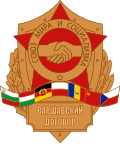Todor Zhivkov | |
|---|---|
| Тодор Живков | |
 Zhivkov in 1971 | |
| General Secretary of the Central Committee of the Bulgarian Communist Party (until 4 April 1981 as First Secretary) | |
| In office 4 March 1954 – 10 November 1989 | |
| Preceded by | Valko Chervenkov |
| Succeeded by | Petar Mladenov |
| 1st Chairman of the State Council until 12 June 1978 as President) | |
| In office 7 July 1971 – 17 November 1989 | |
| Preceded by | Georgi Traykov (as Chairman of the Presidium of the National Assembly) |
| Succeeded by | Petar Mladenov |
| 36th Prime Minister of Bulgaria | |
| In office 19 November 1962 – 7 July 1971 | |
| Preceded by | Anton Yugov |
| Succeeded by | Stanko Todorov |
| 48th Mayor of Sofia | |
| In office 27 May 1949 – 1 November 1949 | |
| Preceded by | Anton Yugov |
| Succeeded by | Stanko Todorov |
| Personal details | |
| Born | Todor Hristov Zhivkov (Bulgarian: Тодор Христов Живков) 7 September 1911 Pravets, Kingdom of Bulgaria |
| Died | 5 August 1998 (aged 86) Sofia, Bulgaria |
| Resting place | Central Sofia Cemetery |
| Political party |
|
| Spouse |
Mara Maleeva-Zhivkova
(m. 1936; died 1971) |
| Children | Lyudmila, Vladimir |
| Signature |  |
| Eastern Bloc |
|---|
 |
Todor Hristov Zhivkov (Bulgarian: Тодор Христов Живков [ˈtɔdor ˈxristof ˈʒifkof]; 7 September 1911 – 5 August 1998) was a Bulgarian communist statesman who served as the de facto leader of the People's Republic of Bulgaria (PRB) from 1954 until 1989 as General Secretary of the Bulgarian Communist Party. He was the second longest-serving leader in the Eastern Bloc, the longest-serving leader within the Warsaw Pact and the longest-serving non-royal ruler in Bulgarian history.[1]
During World War II, Zhivkov participated in Bulgaria's resistance movement in the People's Liberation Insurgent Army. In 1943, he was involved in organising the Chavdar partisan detachment in and around his place of birth, becoming deputy commander of the Sofia operations area in the summer of 1944. Under his rule, many fellow former combatants with Chavdar were to rise to positions of prominence in Bulgarian affairs. He is said to have coordinated partisan movements with those of pro-Soviet army units during the 9 September 1944 uprising.
He became First Secretary of the Bulgarian Communist Party (BCP) in 1954 (General Secretary from April 1981), served as Prime Minister from 1962 to 1971 and from 1971 onwards as Chairman of the State Council, concurrently with his post as First Secretary. He remained in these positions for 35 years, until 1989, thus becoming the longest-serving leader of any European Eastern Bloc nation after World War II,[2] and one of the longest ruling non-royal leaders in modern history. His rule marked a period of unprecedented political and economic stability for Bulgaria, marked both by complete submission of Bulgaria to the Soviet Union[3] and a desire to expand ties with the West. His rule remained unchallenged until the deterioration of East–West relations in the 1980s, when a stagnating economic situation, a worsening international image and growing careerism and corruption in the BCP weakened his position.[4] He resigned on 10 November 1989, under pressure by senior BCP members due to his refusal to recognise problems and deal with public protests.[5] Within a month of Zhivkov's ousting, communist rule in Bulgaria had effectively ended, and within a year the People's Republic of Bulgaria had formally ceased to exist.
- ^ "Todor Zhivkov | Bulgarian political leader". Encyclopedia Britannica. Retrieved 2019-08-14.
- ^ Todor Zhivkov – The longest serving authoritarian Archived 2016-05-23 at the Wayback Machine, The Sofia Echo, 3 April 2003
- ^ Bulgaria – The Zhivkov era, Library of Congress country studies, 1992
- ^ Bulgaria in the 1980s, Library of Congress country studies, 1992
- ^ The Removal of Zhivkov, Library of Congress country studies, 1992